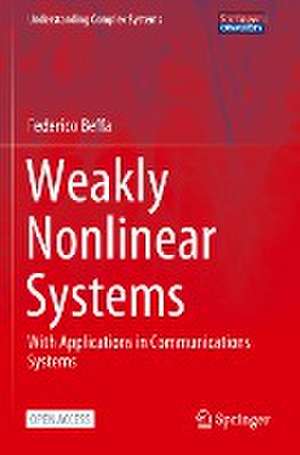Weakly Nonlinear Systems: With Applications in Communications Systems: Understanding Complex Systems
Autor Federico Beffaen Limba Engleză Paperback – 27 oct 2023
| Toate formatele și edițiile | Preț | Express |
|---|---|---|
| Paperback (1) | 304.00 lei 39-44 zile | |
| Springer Nature Switzerland – 27 oct 2023 | 304.00 lei 39-44 zile | |
| Hardback (1) | 439.25 lei 3-5 săpt. | |
| Springer Nature Switzerland – 27 oct 2023 | 439.25 lei 3-5 săpt. |
Din seria Understanding Complex Systems
- 18%
 Preț: 1112.30 lei
Preț: 1112.30 lei -
 Preț: 439.25 lei
Preț: 439.25 lei - 18%
 Preț: 1119.38 lei
Preț: 1119.38 lei - 15%
 Preț: 401.82 lei
Preț: 401.82 lei - 18%
 Preț: 1247.26 lei
Preț: 1247.26 lei - 15%
 Preț: 641.20 lei
Preț: 641.20 lei - 15%
 Preț: 642.68 lei
Preț: 642.68 lei - 15%
 Preț: 651.51 lei
Preț: 651.51 lei - 18%
 Preț: 946.55 lei
Preț: 946.55 lei - 18%
 Preț: 947.98 lei
Preț: 947.98 lei - 20%
 Preț: 650.27 lei
Preț: 650.27 lei - 18%
 Preț: 952.09 lei
Preț: 952.09 lei - 18%
 Preț: 957.13 lei
Preț: 957.13 lei - 18%
 Preț: 943.88 lei
Preț: 943.88 lei -
 Preț: 398.35 lei
Preț: 398.35 lei - 5%
 Preț: 1417.54 lei
Preț: 1417.54 lei - 15%
 Preț: 648.42 lei
Preț: 648.42 lei -
 Preț: 387.75 lei
Preț: 387.75 lei - 18%
 Preț: 1133.76 lei
Preț: 1133.76 lei - 18%
 Preț: 948.16 lei
Preț: 948.16 lei - 20%
 Preț: 655.85 lei
Preț: 655.85 lei - 18%
 Preț: 1113.09 lei
Preț: 1113.09 lei - 20%
 Preț: 655.53 lei
Preț: 655.53 lei - 15%
 Preț: 653.00 lei
Preț: 653.00 lei - 18%
 Preț: 1332.92 lei
Preț: 1332.92 lei - 18%
 Preț: 1010.48 lei
Preț: 1010.48 lei - 18%
 Preț: 955.56 lei
Preț: 955.56 lei -
 Preț: 384.22 lei
Preț: 384.22 lei - 18%
 Preț: 950.66 lei
Preț: 950.66 lei - 15%
 Preț: 638.43 lei
Preț: 638.43 lei - 15%
 Preț: 644.49 lei
Preț: 644.49 lei - 15%
 Preț: 647.40 lei
Preț: 647.40 lei - 15%
 Preț: 649.06 lei
Preț: 649.06 lei - 15%
 Preț: 639.25 lei
Preț: 639.25 lei - 15%
 Preț: 643.65 lei
Preț: 643.65 lei - 18%
 Preț: 960.78 lei
Preț: 960.78 lei - 15%
 Preț: 649.87 lei
Preț: 649.87 lei - 15%
 Preț: 645.47 lei
Preț: 645.47 lei
Preț: 304.00 lei
Nou
Puncte Express: 456
Preț estimativ în valută:
58.17€ • 61.17$ • 48.07£
58.17€ • 61.17$ • 48.07£
Carte tipărită la comandă
Livrare economică 14-19 aprilie
Preluare comenzi: 021 569.72.76
Specificații
ISBN-13: 9783031406836
ISBN-10: 3031406834
Pagini: 371
Ilustrații: XIV, 371 p. 129 illus.
Dimensiuni: 155 x 235 mm
Ediția:1st ed. 2024
Editura: Springer Nature Switzerland
Colecția Springer
Seria Understanding Complex Systems
Locul publicării:Cham, Switzerland
ISBN-10: 3031406834
Pagini: 371
Ilustrații: XIV, 371 p. 129 illus.
Dimensiuni: 155 x 235 mm
Ediția:1st ed. 2024
Editura: Springer Nature Switzerland
Colecția Springer
Seria Understanding Complex Systems
Locul publicării:Cham, Switzerland
Cuprins
Introduction.- Distributions.- Convolution of Distributions.- Fourier Transform of Distributions.- Laplace Transform of Distributions.- Summable Distributions.- Convolution Equations.- Linear Time Invariant Systems.- WNTI Systems.- WNTI Systems Composition.- WNTI Circuits.- Linear Time-Varying Systems.- WNTV Systems.- Periodically Switched Circuits.
Textul de pe ultima copertă
The open access book covers a large class of nonlinear systems with many practical engineering applications. The approach is based on the extension of linear systems theory using the Volterra series. In contrast to the few existing treatments, our approach highlights the algebraic structure underlying such systems and is based on Schwartz’s distributions (rather than functions). The use of distributions leads naturally to the convolution algebras of linear time-invariant systems and the ones suitable for weakly nonlinear systems emerge as simple extensions to higher order distributions, without having to resort to ad hoc operators. The result is a much-simplified notation, free of multiple integrals, a conceptual simplification, and the ability to solve the associated nonlinear differential equations in a purely algebraic way. The representation based on distributions not only becomes manifestly power series alike, but it includes power series as the description of the subclass of memory-less, time-invariant, weakly nonlinear systems. With this connection, many results from the theory of power series can be extended to the larger class of weakly nonlinear systems with memory. As a specific application, the theory is specialised to weakly nonlinear electric networks. The authors show how they can be described by a set of linear equivalent circuits which can be manipulated in the usual way. The authors include many real-world examples that occur in the design of RF and mmW analogue integrated circuits for telecommunications. The examples show how the theory can elucidate many nonlinear phenomena and suggest solutions that an approach entirely based on numerical simulations can hardly suggest. The theory is extended to weakly nonlinear time-varying systems, and the authors show examples of how time-varying electric networks allow implementing functions unfeasible with time-invariant ones. The book is primarily intended for engineering students in upper semesters andin particular for electrical engineers. Practising engineers wanting to deepen their understanding of nonlinear systems should also find it useful. The book also serves as an introduction to distributions for undergraduate students of mathematics.
Caracteristici
Is an open access book Covers a large class of nonlinear systems with many practical engineering applications Includes many real-world examples that occur in design of RF and mmW analogue integrated circuits for telecommunications Highlights the algebraic properties of weakly nonlinear systems
